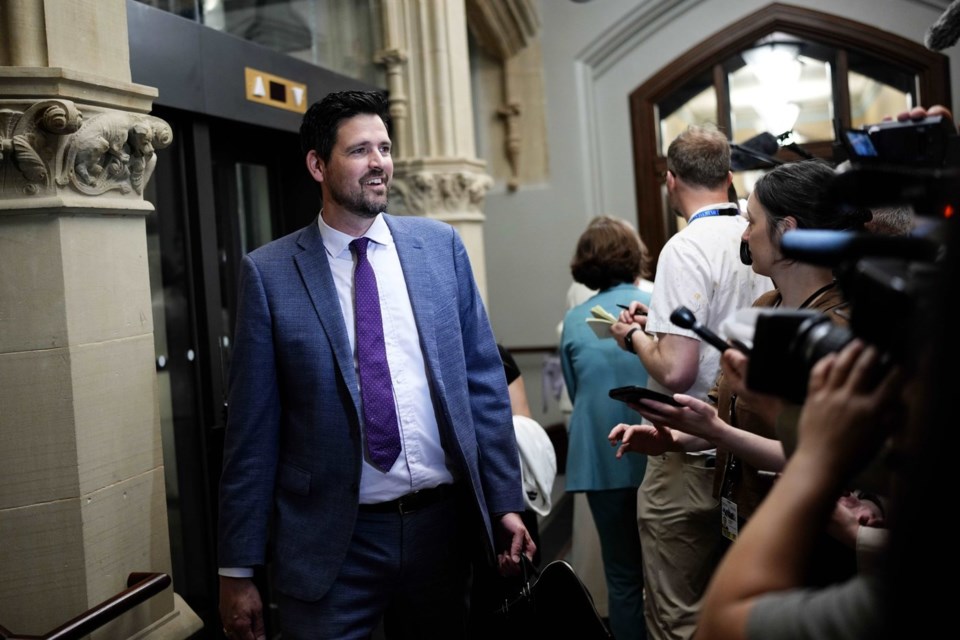OTTAWA — After an election which saw the Conservatives campaign heavily on crime while the Liberals promised stricter measures for offences like violent car thefts, the new minority Liberal government has a stack of new crime policies to implement.
Lisa Kerr, an associate professor at the Queen’s University law school, said the proposals are "all, generally speaking, in the direction of being tougher on crime, but in ways that are targeted to more serious offenders."
She said they will "likely still preserve discretion for Crown prosecutors and judges to respond in appropriate ways to individual cases."
The proposals include tougher bail and sentencing guidelines for some crimes, and the creation of new criminal offences involving intimidation at schools and places of worship, as well as online sexploitation.
Justin Piché, a criminology professor at the University of Ottawa, said the moment reminds him of when Bill Clinton became president of the United States and put forward laws to increase the use of policing and prisons and impose steeper sentences.
"I don't necessarily think it's because he believed in them. I think it was because he didn't want to get outflanked on the right on these issues and lose power and the ability to govern more broadly," he said.
He said the Liberals didn’t want crime "to be an issue for them, and that's clear in the kinds of policies that they’re promoting."
Conservative Leader Pierre Poilievre spent much of the recent federal election campaigning against what he dubbed the "hug-a-thug" criminal justice policies of the previous Liberal government. He promised to counter those policies with measures such as mandatory life sentences for multiple offences.
When experts said a number of those policies would be unconstitutional, Poilievre said he would be willing to use the notwithstanding clause to make them law.
The Liberals put forward a list of crime policies of their own, including a promise to "move aggressively" to implement stricter bail laws for a number of offences.
They committed to making bail more difficult to get for those charged with car thefts involving violence or those conducted for a criminal organization, and for home invasions and some human trafficking and smuggling offences.
Kerr said the move to establish a reverse onus for bail for these crimes — which moves the burden of proof from the prosecutor to the accused — is "likely a response to some of the heated rhetoric around bail that was part of the federal election."
But she said those who make decisions in bail court "are already attentive to public safety in these cases, and we have seen ever-expanding rates of pretrial confinement in a province like Ontario for decades."
Michael Spratt, an Ottawa-based criminal defence lawyer, said people with prior records who were on bail when arrested, and those who used weapons to commit crimes, already "face an uphill battle" to get bail.
"Promising to crack down or to treat those cases seriously ignores the fact that our courts already do," he said.
He gave the example of a Liberal election promise to require courts to prohibit individuals from possessing firearms or weapons if they’re charged with a violent offence or an offence involving a criminal organization. Spratt said that's something that happens already.
Spratt said the Liberals gave "some nods" to tough-on-crime approaches but described some of those measures as "largely performative."
He argued those promises are "much less damaging to our democratic institutions than the sledgehammer that the Conservatives and Pierre Poilievre wanted to use to performatively get tough on crime by undercutting and overriding Charter protections."
The Liberal party platform also promised tougher sentencing guidelines for repeat car thieves and violent and organized crimes. They promised to allow for consecutive sentencing for some cases of car theft and for serious and violent offences.
The Liberals also vowed to make it a criminal offence to intentionally obstruct access to places of worship, schools and community centres, or to intimidate or threaten individuals at those locations.
It’s an issue the Conservatives have used to attack the Liberals repeatedly. The Liberals were accused by some Jewish organizations of not doing enough to protect Jewish communities from acts of violence and hate.
Carney also promised to make distribution of non-consensual sexual deepfakes a criminal offence and to introduce a bill to protect children from online sexploitation and extortion.
Kerr said the proposal on deepfakes is "just a sensible response to changing technology."
Spratt called it an example of "positive criminal justice reform that's really necessary to keep up with modern times."
The measures will be in the hands of new Justice Minister Sean Fraser. It’s not clear which of the promised policies will be government priorities — Carney has released a single mandate letter for all of his ministers and it does not mention the justice policies.
Carney did give a nod to the importance of crime issues to his government by naming Ruby Sahota to the new post of secretary of state for combating crime.
Spratt dismissed the move, using the baseball term "eyewash."
"It is the performative act of getting your uniform dirty to make it look like you are trying really hard," he said.
This report by The Canadian Press was first published May 24, 2025
Anja Karadeglija, The Canadian Press




